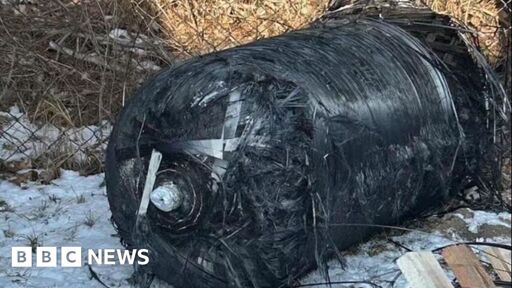- cross-posted to:
- [email protected]
- [email protected]
- [email protected]
- cross-posted to:
- [email protected]
- [email protected]
- [email protected]
At about 03:30 GMT on Wednesday, the sky across northern Europe was illuminated by an object zooming through the air in flames.
[…]
The pyrotechnics were in fact caused by a Space X Falcon 9 rocket re-entering the Earth’s atmosphere. There are reports of sightings in Denmark, Sweden and England.
Pieces of the rocket then crashed into Poland and, experts say, may also have landed in Ukraine.
[…]
The debris appears to have damaged a light fixture in [a] warehouse’s yard.
[…]
The SpaceX Falcon 9 rocket is used to transport people and payloads into the Earth’s atmosphere. It is designed to be reusable.
The rocket which created this debris was launched by SpaceX from the Vandenberg Air Force Base in California on 1 February.
“It was supposed to re-enter the Earth’s atmosphere in a controlled manner and crash into the Pacific Ocean,” Harvard University astrophysicist Dr Jonathan McDowell [said].
"But the engine failed. We’ve seen it orbiting Earth for the past few weeks and we were anticipating an uncontrolled re-entry today, which is what people saw burning in the sky.
[…]
Space debris from rockets and satellites re-enter the Earth’s atmosphere several times a month. Usually pieces of space debris are entirely burned up by Earth’s atmosphere but larger piece can fall to earth. According to Dr McDowell, an uncontrolled large rocket re-entry is rare and has the potential to be dangerous.
“So far, we’ve been lucky and no-one has been hurt but the more we put into the Earth’s orbit, the more likely it is that our luck will run out,” he said.
[…]
As an addition, there has been a Q&A with a space debris expert in the U.S. about that in 2022:
Orbits will be lost—and people will die—later this decade
This radically increasing number of satellites, most of which are orbiting within 1,000 km of the Earth’s surface, comes as low-Earth orbit is ever more cluttered with debris. For example, just last month [November 2022], a Chinese Long March 6A rocket’s upper stage unexpectedly broke apart after delivering its payload into orbit. There are now more than 300 pieces of trackable debris at an altitude from 500 to 1,000 km. And in November 2021, Russia shot down its own Cosmos 1408 satellite, creating more than 1,000 fragments in orbit. NASA’s International Space Station still has to dodge this debris to this day.
So that was what caused those shooting stars in the morning that i heared about in the radio!
President Musk launched a rocket strike against Poland🤣
President Musk just ruled that SpaceX, Tesla, and Xitler are all immune from lawsuits
Nazis at it again!
I want just ONE YEAR to go by without a foreign rocket landing in Poland (or any other NATO nation but especially Poland)! I feel like this is not a hard ask, and reality is really struggling to make it happen.
I am not sure whether I understand all comments (and whether all understand the article), so just for clarification: This is not a deliberate attack against Poland. This is space debris that crashed in Poland accidentally. It can happen anywhere anytime, and it doesn’t matter whether it’s from SpaceX, NASA, ESA, China, Russia, India or any other country. The point is that we have too many of this debris in our earth’s orbit, and we needed international collaboration to eliminate or at least mitigate the risk of falling debris. As the expert in the added article said:
Near-Earth orbital space is finite. We should be treating it like a finite resource. We should be managing it holistically across countries, with coordination and planning and these sorts of things. But we don’t do that.
I think (hope) most people understand that but it’s just too funny to not meme about it
Ministry of Defense wants chief o Polish Space Agency to resign because they didn’t notify them of this rocket launch. Supposedly they sent it to no a longer used email. Somehow that sounds to me that MoD changed emails and expected everyone to adjust on their own. I’m not sure what they wanted to do with this information. Shoot at debris in the sky?





